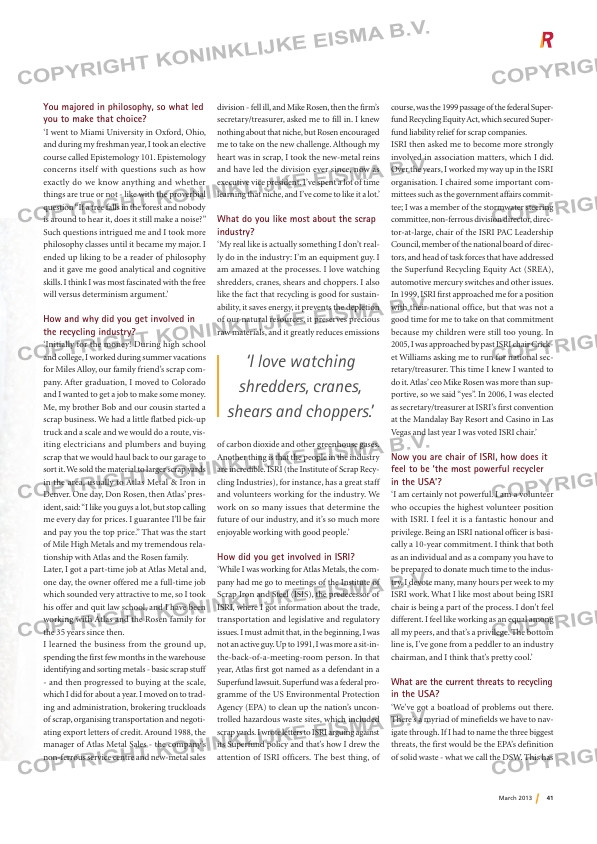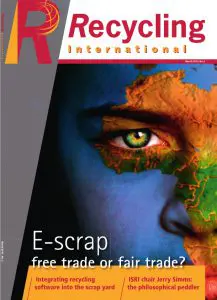Page 41 from: March 2013

41March 2013
ISRI chair Jerry Simms division – fell ill, and Mike Rosen, then the firm’s secretary/treasurer, asked me to fill in. I knew
nothing about that niche, but Rosen encouraged
me to take on the new challenge. Although my
heart was in scrap, I took the new-metal reins
and have led the division ever since, now as
executive vice president. I’ve spent a lot of time
learning that niche, and I’ve come to like it a lot.’
What do you like most about the scrap
industry?
‘My real like is actually something I don’t real-
ly do in the industry: I’m an equipment guy. I
am amazed at the processes. I love watching
shredders, cranes, shears and choppers. I also
like the fact that recycling is good for sustain-
ability, it saves energy, it prevents the depletion
of our natural resources, it preserves precious
raw materials, and it greatly reduces emissions
of carbon dioxide and other greenhouse gases.
Another thing is that the people in the industry
are incredible. ISRI (the Institute of Scrap Recy-
cling Industries), for instance, has a great staff
and volunteers working for the industry. We
work on so many issues that determine the
future of our industry, and it’s so much more
enjoyable working with good people.’
How did you get involved in ISRI?
‘While I was working for Atlas Metals, the com-
pany had me go to meetings of the Institute of
Scrap Iron and Steel (ISIS), the predecessor of
ISRI, where I got information about the trade,
transportation and legislative and regulatory
issues. I must admit that, in the beginning, I was
not an active guy. Up to 1991, I was more a sit-in-
the-back-of-a-meeting-room person. In that
year, Atlas first got named as a defendant in a
Superfund lawsuit. Superfund was a federal pro-
gramme of the US Environmental Protection
Agency (EPA) to clean up the nation’s uncon-
trolled hazardous waste sites, which included
scrap yards. I wrote letters to ISRI arguing against
its Superfund policy and that’s how I drew the
attention of ISRI officers. The best thing, of
course, was the 1999 passage of the federal Super-
fund Recycling Equity Act, which secured Super-
fund liability relief for scrap companies.
ISRI then asked me to become more strongly
involved in association matters, which I did.
Over the years, I worked my way up in the ISRI
organisation. I chaired some important com-
mittees such as the government affairs commit-
tee; I was a member of the stormwater steering
committee, non-ferrous division director, direc-
tor-at-large, chair of the ISRI PAC Leadership
Council, member of the national board of direc-
tors, and head of task forces that have addressed
the Superfund Recycling Equity Act (SREA),
automotive mercury switches and other issues.
In 1999, ISRI first approached me for a position
with their national office, but that was not a
good time for me to take on that commitment
because my children were still too young. In
2005, I was approached by past ISRI chair Crick-
et Williams asking me to run for national sec-
retary/treasurer. This time I knew I wanted to
do it. Atlas’ ceo Mike Rosen was more than sup-
portive, so we said “yes”. In 2006, I was elected
as secretary/treasurer at ISRI’s first convention
at the Mandalay Bay Resort and Casino in Las
Vegas and last year I was voted ISRI chair.’
Now you are chair of ISRI, how does it
feel to be ‘the most powerful recycler
in the USA’?
‘I am certainly not powerful. I am a volunteer
who occupies the highest volunteer position
with ISRI. I feel it is a fantastic honour and
privilege. Being an ISRI national officer is basi-
cally a 10-year commitment. I think that both
as an individual and as a company you have to
be prepared to donate much time to the indus-
try. I devote many, many hours per week to my
ISRI work. What I like most about being ISRI
chair is being a part of the process. I don’t feel
different. I feel like working as an equal among
all my peers, and that’s a privilege. The bottom
line is, I’ve gone from a peddler to an industry
chairman, and I think that’s pretty cool.’
What are the current threats to recycling
in the USA?
‘We’ve got a boatload of problems out there.
There’s a myriad of minefields we have to nav-
igate through. If I had to name the three biggest
threats, the first would be the EPA’s definition
of solid waste – what we call the DSW. This has
You majored in philosophy, so what led
you to make that choice?
‘I went to Miami University in Oxford, Ohio,
and during my freshman year, I took an elective
course called Epistemology 101. Epistemology
concerns itself with questions such as how
exactly do we know anything and whether
things are true or not – like with the proverbial
question “If a tree falls in the forest and nobody
is around to hear it, does it still make a noise?”
Such questions intrigued me and I took more
philosophy classes until it became my major. I
ended up liking to be a reader of philosophy
and it gave me good analytical and cognitive
skills. I think I was most fascinated with the free
will versus determinism argument.’
How and why did you get involved in
the recycling industry?
‘Initially for the money! During high school
and college, I worked during summer vacations
for Miles Alloy, our family friend’s scrap com-
pany. After graduation, I moved to Colorado
and I wanted to get a job to make some money.
Me, my brother Bob and our cousin started a
scrap business. We had a little flatbed pick-up
truck and a scale and we would do a route, vis-
iting electricians and plumbers and buying
scrap that we would haul back to our garage to
sort it. We sold the material to larger scrap yards
in the area, usually to Atlas Metal & Iron in
Denver. One day, Don Rosen, then Atlas’ pres-
ident, said: “I like you guys a lot, but stop calling
me every day for prices. I guarantee I’ll be fair
and pay you the top price.” That was the start
of Mile High Metals and my tremendous rela-
tionship with Atlas and the Rosen family.
Later, I got a part-time job at Atlas Metal and,
one day, the owner offered me a full-time job
which sounded very attractive to me, so I took
his offer and quit law school, and I have been
working with Atlas and the Rosen family for
the 35 years since then.
I learned the business from the ground up,
spending the first few months in the warehouse
identifying and sorting metals – basic scrap stuff
– and then progressed to buying at the scale,
which I did for about a year. I moved on to trad-
ing and administration, brokering truckloads
of scrap, organising transportation and negoti-
ating export letters of credit. Around 1988, the
manager of Atlas Metal Sales – the company’s
non-ferrous service centre and new-metal sales
‘I love watching
shredders, cranes,
shears and choppers.’
RI_2-Interview.indd 41 06-03-13 14:40



